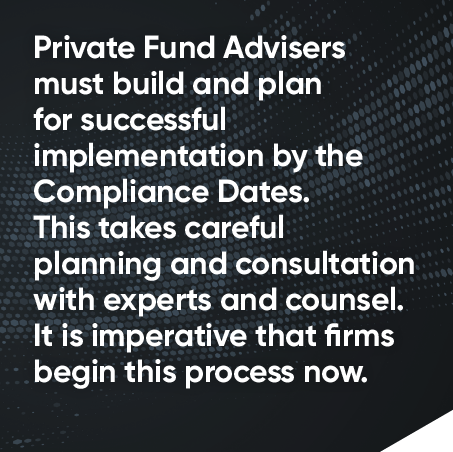Takeaways from the SEC’s New Private Fund Adviser Rules – Build and Plan for Successful Implementation
The private fund regulatory landscape just got more complex with the August 23 SEC adoption of these long-awaited private fund rules, which were first proposed 18 months ago in the face of industry pushback. These rules align with the agenda by SEC Chairman Gary Gensler, who has been steadfast in his commitment to enacting a proposed rule. The rules address the risks and harm to investors and funds identified by the SEC, such as conflicts of interest, lack of transparency, and lack of governance mechanisms.
Notably, although included in the initial rule proposal, no changes were made to private fund liability rules, which would have made it much easier for LPs to sue GPs
With the final rules enacted and a long and varied runway of compliance dates, now is the critical time for Advisers to prepare, build and implement a plan for successful compliance implementation.
9 Key Takeaways from These New Rules:
| Rule Number: | Topic: | Takeaway: |
|---|---|---|
| 1. Amended Rule 206(4)-7 | Written Annual Compliance Review (All SEC Registered Advisers) | All SEC advisers, not just those to private funds, are required to document in writing the Annual Review of their compliance policies and procedures. |
| 2. New Rule 211(h)(1)-2 | Private Fund Quarterly Statements (SEC Registered Private Fund Advisers) | The rule requires SEC registered private fund advisers to distribute a quarterly statement to investors in the funds, including information in “table form” on fees and expenses, performance, adviser compensation, all portfolio investment compensation, and fee and performance calculation methodology details to ensure transparency. |
| 3. New Rule 211(h)(2)-2 | Adviser – Led Secondaries Fairness or Valuation Opinion (SEC Registered Private Fund Advisers) | Regarding adviser-led secondaries, it will require that the advisers must obtain and distribute to investors an independent fairness or valuation opinion. The above is required when offering existing fund investors the option between selling their ownership interests in a private fund and converting or exchanging their interests in the private fund for interests in another investment vehicle advised by the adviser or any of its related persons. In addition, the adviser must prepare and distribute to investors a summary of any material business relationships over the past two years between the adviser, its related persons and the opinion provider. |
| 4. New Rule 211(h)(2)-3 | Preferential Treatment (For All Private Fund Advisers) | Private fund advisers are prohibited from providing preferential terms to investors regarding a) certain redemptions from the fund unless the investors have the ability to redeem because it is required by applicable law or the adviser offers the preferential redemption rights to all other investors without qualification; and b) certain preferential information concerning portfolio holdings or exposures, unless such preferential information is offered to all investors. In addition, private fund advisers cannot provide preferential treatment to investors unless certain terms are disclosed in advance of an investor’s investment in the private fund and all terms are disclosed after the investor’s investment. |
| 5. New Rule 211(h)(2)-3 | Restricted Activities (For All Private Fund Advisers) | Prohibits an adviser from charging to the fund fees and expenses related to investigations that result in a court or government authority sanctioning the adviser for violating the Advisers Act.
Restrictions on charging fees or expenses associated with an investigation of the adviser without disclosure and consent from fund investors (such expenses cannot be charged where a sanction is imposed). Prohibits charging regulatory, examination or compliance fees unless detailed notice to investors is provided. Prohibits charging fees related to a portfolio investment on a non-pro-rata basis unless the allocation approach is fair and equitable with advance written notice and description details. There are also additional restrictions on reducing the amount of an adviser clawback by the amount of certain taxes unless written notice of both pre-tax and post-tax amounts is provided. Prohibited from borrowing or receiving an extension of credit from private funds without written notice and consent from a majority of unrelated investors. |
| 7. New Rule 206(4)-10 | Private Fund Audits (SEC-Registered Advisers) | Annual fund financial statement audits by an independent public accountant are required for all private funds. The new requirements account for strengthened annual audit requirements to ensure greater transparency and must meet the audit requirements of Advisers Act Rule 206(4)-2). |
| 8. Amended Rule 204-2 | Recordkeeping Rule (For SEC Registered Advisers) | There are recordkeeping requirements for Quarterly Statements, the Audit Rule, Adviser-Led Secondaries, Restricted Activities, Preferential Treatment, and the Annual Review. |
| 9. Adviser Misconduct | Existing Fiduciary and Anti-Fraud Provisions | While the SEC did not adopt a rule, the SEC stated in the Adopting Release that charging fees without providing a service to a private fund client is inconsistent with the adviser’s fiduciary duty. In addition, an adviser is not permitted to charge for services that it does not reasonably expect to provide. Similarly, while not adopting a rule, the SEC stated in the Adopting Release that the fiduciary duty and antifraud provisions apply to limiting or eliminating liability, as discussed in detail in the Adopting Release. |
Please refer to the SEC Related Materials for complete information.
Key Compliance Dates:
| Rule Number: | Compliance date – (After Federal Register publication date): | Type of Adviser: |
|---|---|---|
| Amended Rule 204-2 – Record Keeping | 12 months (>$1.5 Billion in PF assets) – 18 months (<$1.5 Billion in PF assets) | SEC-Registered Private Fund Advisers |
| Amended Rule 206(4)-7 Written Annual Compliance Review | 60 days | For All SEC Registered Advisers |
| New Rule 206(4)-10 Private Fund Audits | 18 months | SEC-Private Fund Registered Advisers |
| New Rule 211(h)(1)-2 Private Fund Quarterly Statements | 18 months | SEC-Registered Private Fund Advisers |
| New Rule 211(h)(2)-1 Private Fund Adviser Restricted Activities | 12 months (>$1.5 Billion) – 18 months (<$1.5 Billion) | For All Private Fund Advisers |
| New Rule 211(h)(2)-2 Adviser-Led Secondaries | 12 months (>$1.5 Billion) – 18 months (<$1.5 Billion) | SEC-Private Fund Registered Advisers |
| New Rule 211(h)(2)-3 Preferential Treatment | 12 months (>$1.5 Billion) – 18 months (<$1.5 Billion) | For All Private Fund Advisers |
Conclusion: Time to Buckle up with Foresight and Planning
As the regulatory landscape continues to shift, it is imperative for advisers to be proactive and adapt to the changing environment to best serve fund investors. The SEC’s Private Funds Rules have expanded the regulation of private fund advisers.
Private Fund Advisers must build and plan for successful implementation by the Compliance Dates. This takes careful planning and consultation with experts and counsel. It is imperative that firms begin this process now.
Planning includes items such as:

- Evaluating the rule’s impact,
- Updating policies and procedures,
- Planning processes for distribution and consents,
- Planning for recordkeeping changes,
- Conducting Annual Fund Audit,
- Developing disclosures,
- Planning processes, content and disclosures related to Statement distribution,
- Revisiting fund fees and expenses,
- Reviewing side letter terms, among other measures,
- Operational changes,
- Planning and Conducting testing,
- Conducting Training,
- Documenting the Annual Review in writing,
- Among Others
Although the compliance period varies among managers, as noted above, we are likely to see a significant impact on future SEC examinations and enforcement activities.
Advisers need to prepare for change with the new regulations as emphasized by Chair Gensler’s analogy to the evolution of the boxing champion from Rocky to Creed during the August 23 meeting (U.S. Securities and Exchange Commission, 2023)
To learn more about how to prepare for implementation of the Private Fund Rule and to learn more about Confluence’s Compliance Services and regulatory reporting solutions, contact us at info@confluence.com
Contact Us HereDisclaimer: The information contained in this communication is for informational purposes only. The opinions expressed herein are those of the author and do not necessarily reflect those of Confluence. Confluence is not providing legal, financial, accounting, compliance, or other similar services or advice through this communication. Recipients of this communication are responsible for understanding the regulatory and legal requirements applicable to their business.



